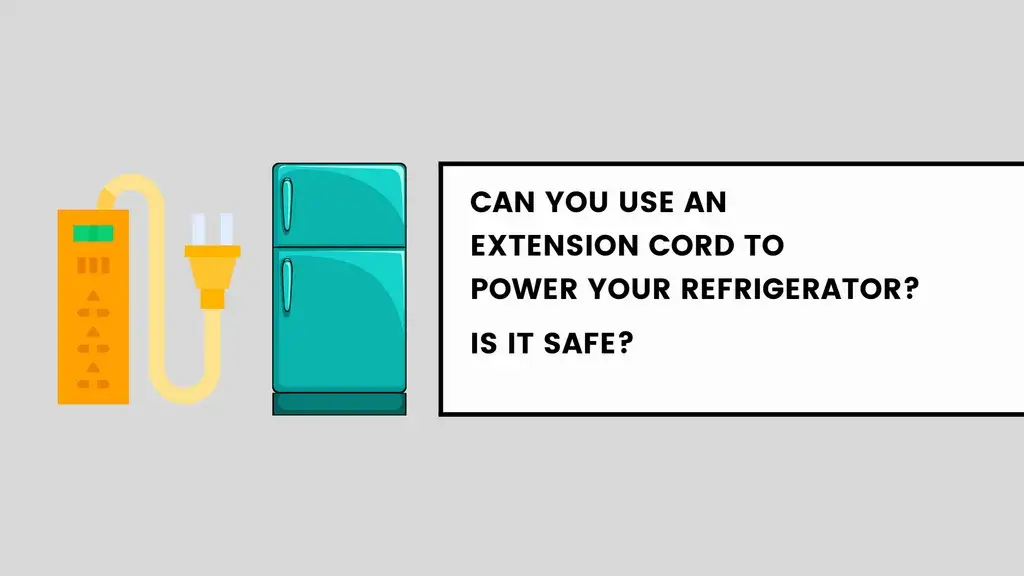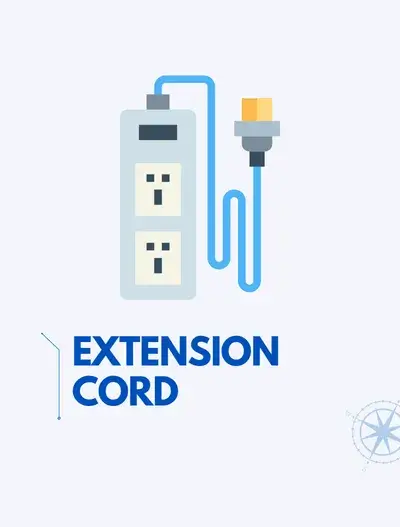Are you considering using an extension cord to power your refrigerator? While it is an easy solution to a lack of outlets or a longer distance between your fridge and the power source, using an extension cord with your refrigerator can be quite dangerous.
This blog post will take a closer look at the risks and benefits of using an extension cord to power your refrigerator and explore some safer alternatives. From electrical safety concerns to potential fire hazards, we will provide you with the information you need to make an informed decision. Whether you’re a homeowner, apartment dweller, or renter, this guide will give you the knowledge you need to keep your home safe and food fresh.
Table Of Contents

What is an Extension Cord?
Extension cords have been around for decades, serving as an invaluable resource for powering appliances and other electronics. What exactly is an extension cord, though?

An extension cord, also known as a power extension cable, is a long electrical cord that allows you to extend the reach of a power outlet. They typically have a male plug on one end and a female receptacle on the other, allowing you to connect multiple devices to a single outlet. They come in various lengths (ranging from 6 feet up to 100 feet), gauges, and amperage ratings. They can power everything from small appliances to large power tools. Extension cords also come with surge protection and water resistance features – perfect for outdoor and traditional indoor use. They are a common household item found in hardware stores, home improvement stores, and online retailers.
Can Extension Cords be used for powering Refrigerators?
The short answer is yes, extension cords can be used to power refrigerators, but it is not recommended.
Extension cords are convenient at home and can be used for various purposes. But whether or not they can be used to power refrigerators depends on a few factors and should be taken seriously as there are potential risks involved. Therefore, it should only be done with caution and in certain situations. For example, a standard extension cord should never be used for refrigerators; heavy-duty cords with thicker insulation should always be used. Furthermore, it’s essential to ensure that the amp rating of the cord matches that of the refrigerator.
Why are Extension Cords not recommended for Refrigerators?
There are several reasons why extension cords are not recommended for powering refrigerators. The first reason is that refrigerators require a consistent and stable power supply, which an extension cord may not be able to provide. This is because extension cords are not designed to handle a large amount of power a refrigerator needs.
Additionally, refrigerators are heavy-duty appliances that run continuously, and an extension cord may not be able to handle the constant load. Another reason is that extension cords can overheat or become damaged over time, leading to electrical fires, a serious safety hazard. Furthermore, using an extension cord may also void the refrigerator’s warranty. For all these reasons, it’s best to avoid using extension cords to power refrigerators and use a proper outlet or circuit instead. It’s also important to note that using an extension cord with a lower amperage rating than the refrigerator will also cause issues.
Extension Cord alternatives to power Refrigerators?
Extension cords are a common and convenient way to power appliances like refrigerators, but they can be dangerous. Overloaded cords can spark fires or cause electrocution, so what’s the alternative to using an extension cord? Several options are available if you are looking for an alternative to using an extension cord to power your refrigerator.
One of the best alternatives is to have a licensed electrician install a new outlet or circuit near the refrigerator. This will provide a stable and consistent power supply for the fridge and reduce the risk of electrical fires or other hazards.
Another alternative is to use a heavy-duty power strip specifically designed for large appliances like refrigerators. These power strips have built-in circuit breakers and surge protection, which can help to protect the fridge and other connected devices from power surges.
If you want to reduce energy consumption and costs, consider using a smart power strip. Which allows you to control and monitor the power usage of your refrigerator and other connected devices from a mobile app. You can also invest in a portable generator that provides a reliable power supply during power outages or other emergencies.
It’s essential to ensure that any alternative you choose is rated for the wattage of your refrigerator and has safety features such as surge protection and overheat protection. It’s also recommended to check your refrigerator’s warranty policy before deciding on an alternative, as some methods may void the warranty.
Final Words
In conclusion, many people need clarification about whether or not it is safe to use an extension cord to power a refrigerator. While it is technically possible, it is not recommended because of the potential safety risks associated with overloading the circuits and cords. This could lead to fire hazards and should be avoided. Instead, consider installing additional outlets near the appliance to support heavy loads.
Frequently Asked Questions
– Use a heavy-duty cord rated for the refrigerator’s power usage.
– Avoid frayed or damaged cords; keep the cord as short as possible.
– Use the appropriate gauge, and ensure the cord is properly grounded and the plug is securely inserted.
– Avoid running the cord under carpets or furniture.
– Never use multi-plug adapters or splitters.
